
In recent times, subconsciously or unconsciously many women awards have been organized from different platforms focusing mostly celebrities and top-tier professional women but none have accredited these nation builders for their unapparelled contribution as of yet. By nation builders we mean those lone workers, the ones toiling in the villages, in areas less developed and places where opportunities seldom come to the men, let alone the women. And little do we realize; how much does it take to shun all possible barriers and excuses and dedicate your life for the welfare of the surrounding and people.
This time, we have come together to endorse these grassroot women who had the zeal to go beyond their limitations, thus building the nation we dream of. IPDC Finance Limited in association with The Daily Star have taken the initiative for the very first time in Bangladesh to acknowledge root level women change makers with the " Unsung Women Nation Builders Award 2017 ".
Scroll below the read about the seven extraordinary souls who have chosen the bold ways to craft their life unlike many of us.
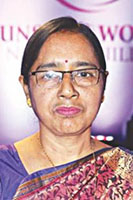
Woman of green
When she became the director general of BRRI in June 2016, Bhagya Rani Banik was the first woman to hold that post. She graduated from Sher-e- Bangla Agricultural University and joined Bangladesh Agricultural Research Institute (BARI) in 1983. MsBanik earned her PhD from Bangabandhu Sheikh Mujibur Rahman
Agriculture University in 2003. She has significant contribution in food sufficiency and climate change research. Under her leadership BRRI has achieved international success. She has contributed in developing better breed of corn. She has 37 research articles published in national and international scientific journals.
- WOMAN OF GREEN
- http://bit.ly/2pFpirB
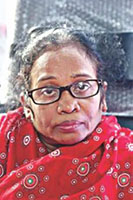
An indomitable soul
Even though her legs became paralysed, IraniBaroi did not give up her mission of helping the sick. Irani is a senior nurse today at the 100-bed general hospital in Madaripur.
She earned her diploma in Nursing from Dhaka Medical College and Hospital in 1986 and started her career in Madaripur General Hospital. She came down with fever in 1996 and her hands and legs became paralysed. Therapy brought back the use of her hands but her legs did not improve.
Despite being paralyzed, she is by no means inferior to any other nurse in her hospital, her patients, superiors, and coworkers testify. She believes as long as she can use her hands, she can continue to help her patients in every way possible.
- NIGHTINGALE OF NARAYANGANJ
- http://bit.ly/2pFnAqd
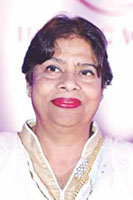
First female police officer
First woman police officer and additional inspector general of police
Fatema Begum is one of the first two women who chose to join the police service after their Bangladesh Civil Service (BCS) exam in 1984.
The other quitted soon but she continues to serve in the police and became the first woman to become an additional inspector general of police.
"Firm in their belief that the police force was no place for women, they tried to make us leave from the very first day -- beginning with barring our entry at the orientation for new officers," says Fatema. She was forced by her bosses to write to the home ministry asking it to give her a posting in some other cadre service. After the training was over, the male officers were ordered to pack and go to the Police Academy. But there was no instruction for Fatema. She waited and waited, but no orders came. A couple of days later, she wrote to the Police Headquarters saying she would not give up her job and that she would rather wait further. She was allowed to go to the academy after she persisted.
- FATEMA PERSISTED DESPITE CONSTANT TAUNTS
- http://bit.ly/2qpwBEI
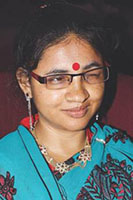
Blindness no bar to teaching
Rokeya Begum, who became blind at the age of 3, is an assistant teacher of Tambulkhana govt primary school. Her indomitable spirit has brought her to this position. She teaches like any regular teacher. Moreover, she is a popular teacher.
She had to struggle to be here today. Her father Sheikh MujiborRahaman died leaving five daughters and one son. Three of the sisters are also blind. When her mother also died after a few years, their elder sister Sahanaj Begum took them in.
Now Rokeya's two blind sisters are in University. Shekha Begum, 29, is a student of MA in the Department of Social Science at Eden Mohila College Dhaka. AshiaAkter, 22, is a student of BA in the Department of History at Dhaka University.
"She is a really good teacher and also a good person," said KakoliSaha Head master of Tambulkhana Government Primary School. "She is meritorious and she has an indomitable spirit."
- WHERE THERE IS A WILL
- http://bit.ly/2p5M7BG
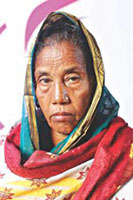
Selfless midwife
SonajanAkter of Chowbaria at Manikganj has been serving as a midwife for the entire village as well as at least 15 other villages for the past 50 years. The sixty-eight-year-old does not accept any payment for her services despite her family being extremely poor.
She takes care of the mothers, and later, their babies, for up to 10 days after birth. Relatives and acquaintances testify she looks after the mothers and children just as a grandmother would-- with utmost care and affection.
- SAVIOUR OF EXPECTING MOTHERS
- http://bit.ly/2p2Eb3q
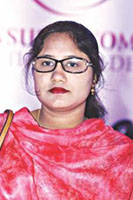
The light of Joypurhat
Because Maftahul Jannat Likhon decided to install solar panels free of charge in three villages two years back, students from the poorest families can now study at night in these villages of Joypurhat'sPanchbibiupazila.
When many people would leave empty handed from her solar power sales center because of the high price, she started to feel the problems children faced in those families. She felt children from the poorest of families should have a fair chance to go to school and having bright lights to study at night could boost their morale.
Nowadays, the three villages are collectively called "Solargram" and 148 families have solar lights because Likhan felt that she had to do something to help.
But bright lights are not enough. One also needs books. In March this year, Likhan visited her Solargram with bundles of children's books to be distributed for free. From solar lights to light of knowledge, Likhan has them all.
- THE LIGHT OF JOYPURHAT
- http://bit.ly/2pFb1v2
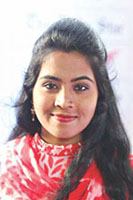
Malala of Bangla
For her work against child marriage, Shahida Akhter Shorna was dubbed the 'Malala of Bangla' by Norwegian Prime Minister Erna Solberg at an international conference of Plan International, an organisation that works for children's rights worldwide.
Shorna endured pressure for early marriage like all the other girls in her village. Her elder sisters, all four of them, had given in without a protest when their time came. But Shorna did not. She was adamant that completing her education was her first priority.
It was her wholehearted campaign for girls' education in her village that put her on par with Malala Yousafzai. Although there were no gun-toting Taliban insurgents patrolling her village, hers was no less challenging a task than Malala's.
President of Gazipur'sMawna Union Shishu Forum of Plan Bangladesh, where she joined in 2006, Shorna is now a marriage-buster in her community and also an icon. She has stopped six child marriages in her union so far.
Shorna always took it upon herself to organise students for different events. She showed her leadership quality during those programmes. Shorna, who once wanted to be a doctor, now wants to serve the society by becoming a university or college teacher.
- 'MALALA OF BANGLA' BLAZES THE TRAIL
- http://bit.ly/2p2DtmM
